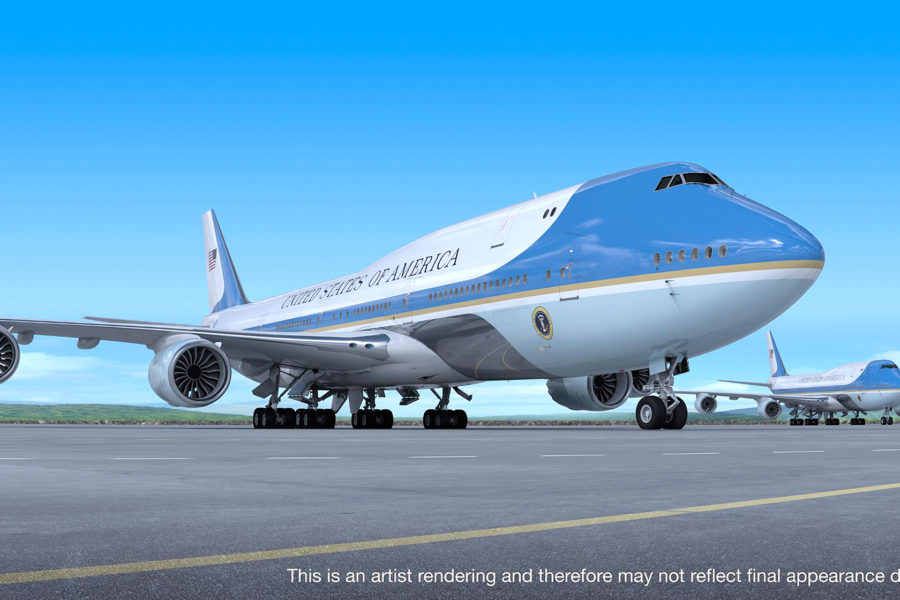Boeing is taking a $482 million loss on its VC-25B/Air Force One program to build two new Presidential transports, company executives reported in their third quarter earnings call Oct. 25. Combined with previous charges of $660 million against the program, Boeing’s cumulative losses on VC-25B now total $1.3 billion.
Separately, the company’s defense and space unit took a $350 million loss on an unnamed satellite program, and a $136 million charge on its MQ-25 refueling drone for the Navy. Along with the $482 million loss on VC-25B, Boeing’s defense programs were in the red to the tune of $1.02 billion in the third quarter.
No charges were announced on the T-7 trainer or KC-46 tanker, where Boeing has taken serious financial hits in recent years. Boeing has eaten more than $7 billion in losses on the KC-46.
Boeing president and CEO David Calhoun said the losses mostly affect defense programs under fixed-price contracts, where Boeing must make up any overages on its own dime. Other factors hitting the programs he cited were the effects of inflation and supply-chain issues, as well as engineering changes and labor shortages.
“In a fixed-price environment, any unplanned hurdles can introduce unrecoverable costs,” Calhoun said of the VC-25B. Boeing is “getting past these hurdles” and is “committed to delivering two exceptional airplanes for our customers.”
Boeing fired its vendor for the VC-25B program’s interior, GDC Technics, in 2021, complaining that it was late in delivering work, disrupting the whole project. The company countersued that Boeing’s own financial difficulties and engineering were to blame, but the debacle put the program at least two years behind schedule.
“We are maturing through this build process,” Calhoun said of the VC-25B, “incorporating engineering changes to better support the installation process. And we resolved important supplier negotiations over the course of the quarter.” He noted that “none of these items will impact the performance and capability of the end product.”
Brian West, executive vice president and chief financial officer, said the VC-25B charge was “due to higher estimated manufacturing costs, related engineering changes, labor instability and the resolution of supplier negotiations.”
On the satellite, Calhoun said “we’re expecting higher costs … as we build out the constellation and meet our life cycle commitments for our customer. We’re working on real innovation and advanced capabilities in this space and see real potential market as we deliver against this commitment.”
He said there are “signs of progress” in getting Boeing Defense and Space back to profitability but “financial improvement at BDS’ lower volumes takes time.” Getting margins back to where the company expects them will happen by 2025 or 2026, he added.
To improve, the company is “driving Lean Manufacturing Program Management rigor and cost productivity consistently across the division,” West said. “We’ve invested in new training programs to accelerate performance on the factory floor and we deployed resources at our suppliers to support their recovery. Perhaps most importantly, we instituted much tighter underwriting standards,” and the company is working to deal with “our legacy contracts that we need to get out from under.”
“Rest assured, we haven’t signed any fixed-price development contracts, nor [do we] intend to,” West said. “These moves are all fundamental to accelerating the recovery by the ’25-‘26 timeframe.”
The “large, fixed-price development programs” like the KC-46 represent 15 percent of BDS’ portfolio, West added.
“We continue to be focused on maturing and retiring these risks; specifically, in the KC-46.” He said “we’re stabilizing the production system. We’ve seen signs of progress and improved productivity and as of this month, we have delivered 77 tankers to the customer.”
Calhoun said he is not surprised that Airbus has opted to continue offering the A330 Multi-Role Tanker Transport after Lockheed Martin withdrew from the so-called “bridge tanker” program this week, killing its LMXT joint venture with Airbus.
“We shouldn’t expect them to, sort of, vacate,” he said, adding, “We are not afraid of competition.”
But Calhoun also admitted that the next contract for the KC-46 “matters a lot. We have to ultimately underwrite the costs and get this right, and as we’ve committed to you all along, we’re going to stay disciplined on that front,” meaning that Boeing won’t lowball its offer on the bridge tanker.
